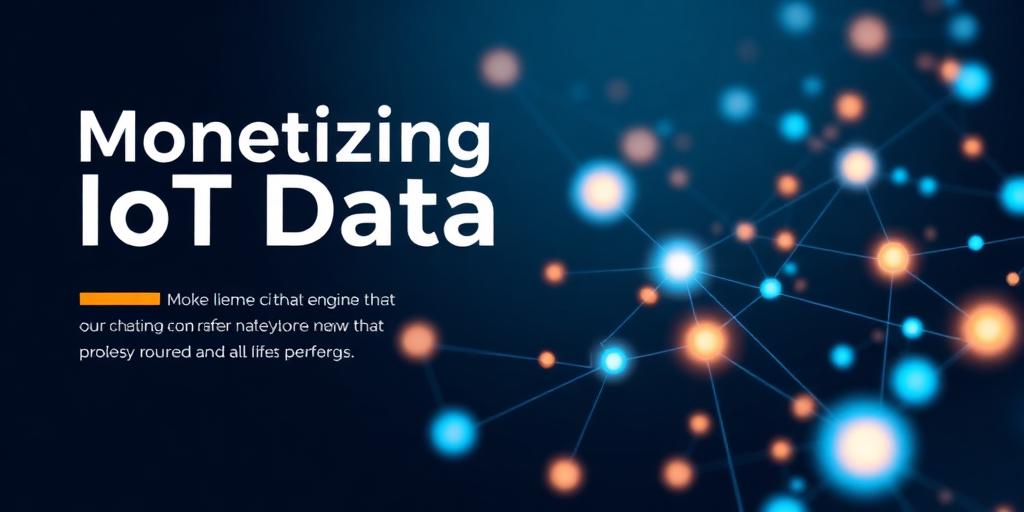In an increasingly interconnected world, the Internet of Things (IoT) generates an unprecedented volume of data. From industrial sensors to smart city infrastructure and consumer wearables, this data represents more than just operational insights; it is a burgeoning asset with immense economic potential. For organizations investing in IoT deployments, the crucial next step is to understand and implement effective strategies to monetize IoT data, transforming raw information into significant revenue streams. This guide delineates sophisticated approaches to unlock this value, offering a strategic framework for IoT data monetization strategies.
Why Monetize IoT Data?
The sheer volume and real-time nature of IoT data offer unparalleled opportunities for value creation. Beyond optimizing internal operations, the insights derived can be packaged and sold, forming new revenue channels. Effective IoT data value creation moves beyond simple data collection, focusing on refining, analyzing, and presenting data in forms that are directly valuable to third parties or enhance existing product offerings. Organizations that master this stand to gain a competitive edge by generating revenue from sensor data.
Key Monetization Strategies
To effectively monetize IoT data, a nuanced understanding of various strategic models is essential. Each approach offers distinct advantages and can be tailored to specific industry contexts and data types.
1. Direct Data Sales (Raw or Processed): The most straightforward approach involves selling access to your IoT data. This can range from raw sensor readings to aggregated, anonymized datasets. Industries like finance, urban planning, and logistics often seek such data for market analysis, risk assessment, or predictive modeling. The key here is ensuring data quality, legal compliance (especially concerning privacy), and the establishment of clear pricing models based on volume, velocity, or specific attributes. This model directly facilitates selling IoT insights.
2. Value-Added Services and Insights: Beyond raw data, significant value lies in the actionable insights derived from it. This involves sophisticated analytics, machine learning, and AI models that interpret data to provide predictive maintenance alerts, optimize resource allocation, or offer personalized recommendations. For instance, an industrial IoT provider might offer a service that predicts equipment failure based on sensor data, or a smart home company could sell energy consumption optimization services. This strategy moves up the value chain, focusing on solutions that leverage data rather than just the data itself. It's a prime example of advanced IoT business models for data.
3. Product-as-a-Service (PaaS) or Outcome-Based Models: In this model, the IoT-enabled product or system is not sold outright but offered as a service, with pricing tied to performance, usage, or specific outcomes. For example, a manufacturer of industrial machinery might charge based on uptime achieved (guaranteed by IoT monitoring) rather than selling the machine itself. This aligns provider incentives with customer success, making the IoT data integral to the service delivery and value proposition. It represents a mature form of generating revenue from sensor data by bundling it with operational benefits.
4. Ecosystem and Platform Monetization: Organizations can build or participate in IoT data marketplaces or platforms, serving as intermediaries or facilitators. By aggregating data from multiple sources, standardizing formats, and providing APIs, they create an environment where data providers and consumers can transact. Revenue can be generated through subscription fees, transaction commissions, or premium feature access. This approach leverages network effects, creating a scalable model for IoT data monetization strategies.
5. Data Exchange and Bartering: In some scenarios, direct monetary transactions may be less relevant than data exchange for mutual benefit. Companies might trade specific datasets to enrich their own analytical capabilities, leading to shared insights or collaborative product development. While not directly generating cash, it can lead to significant cost savings or competitive advantages that indirectly contribute to revenue.
Challenges and Considerations
While the potential to monetize IoT data is vast, several critical challenges must be addressed for sustainable success:
- Data Privacy and Security: Adhering to regulations like GDPR or CCPA is paramount. Robust security measures are non-negotiable to protect sensitive data from breaches and unauthorized access.
- Data Quality and Governance: Inaccurate or inconsistent data undermines any monetization effort. Establishing clear data governance policies and ensuring data integrity from source to consumption is vital.
- Ethical Implications: Transparent data collection and usage policies are essential to build trust with data providers and consumers.
- Scalability and Infrastructure: Handling vast streams of real-time IoT data requires robust, scalable infrastructure for processing, storage, and analysis.
- Legal and Regulatory Compliance: Navigating complex global data regulations, licensing, and intellectual property rights is crucial.
Steps to Success
A systematic approach is key to effective IoT data monetization:
- Identify High-Value Data Points: Determine which data elements are unique, actionable, and in demand.
- Define Target Audience and Use Cases: Understand who needs your data and for what purpose.
- Choose Appropriate Monetization Models: Select strategies that align with your data assets, business capabilities, and market needs.
- Invest in Data Infrastructure and Analytics: Ensure you have the tools to collect, process, analyze, and deliver data effectively.
- Prioritize Data Governance, Security, and Compliance: Build trust and mitigate risks from the outset.
- Develop Clear Pricing and Licensing Models: Establish fair and competitive structures for data access.
- Pilot and Iterate: Start small, learn from early deployments, and continuously refine your approach.
Conclusion
The journey to monetize IoT data is not merely a technical endeavor; it is a strategic business imperative. By systematically identifying valuable data, understanding market needs, and implementing robust monetization models, organizations can transform their IoT investments into significant new revenue streams. The future of digital economies hinges on the ability to derive and capitalize on insights from connected devices, making strategic IoT data value creation a cornerstone of competitive advantage in the modern era.









